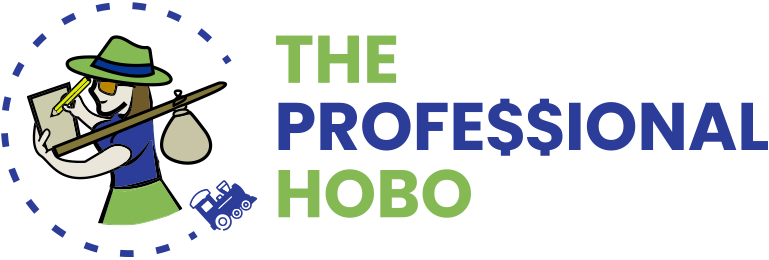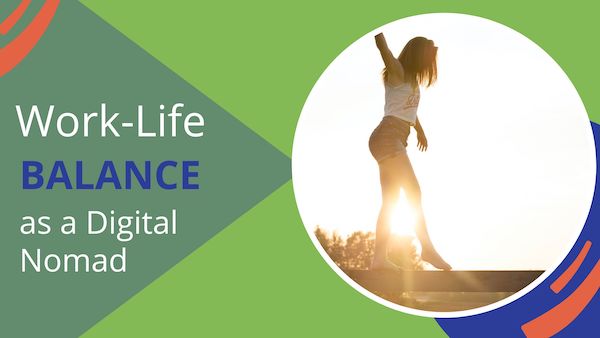Work-life balance is a moving target as a digital nomad; a delicate dance that requires constant adjustments. I once said in a podcast interview: “get used to feeling guilty. When you’re working, you’ll feel guilty for not getting out there and exploring your destination, and when you’re out exploring, you’ll feel guilty for not working.”
The reality is not quite so bleak. You don’t have to be under the thumb of self-imposed guilt trips all the time. In fact I think this speaks more to my own personal idiosyncrasies rather than the digital nomad lifestyle as a whole, but I’ll save that musing for my therapist.
What I do know, however, after conversations with dozens upon dozens of colleagues, is that travel as a lifestyle involves work, which means in our paying work it’s all the more important to be streamlined and productive.
To that end, I’ve brought in Debra Joy to give us some solid productivity tips to help us all get the most out of travel, work, and life.

Debra Joy has co-founded 3 businesses and one national non-profit. She’s lived in big cities, a busy beach community, a small farming town, and a remote Mexican village only accessible by boat. For over 15 years she’s been coaching entrepreneurs, executives, and creatives to optimize their performance. Her online program, The Success Solution, teaches ambitious people how to work less, stress less, and achieve more, wherever they are.
Without further ado, please enjoy Deb’s advice on work-life balance.
___________________
I bet when you hit the road as a digital nomad you had visions of how your life would be. New places, people and exciting adventures. Sipping coffee on sideway cafes and hiking mountains with views that take your breath away. And somewhere in between, your work would get done.
Now what you’re experiencing might be something quite different. It might be something more like – new city, same old stress.
Most remote workers with flexible schedules blow it. Because they have no imposed structure, they work all the time, or at least feel like they’re working all the time. When they’re working, they feel like they should be doing something else because they hit the road for adventure. When they’re not working, they feel guilty, so they can’t fully enjoy what they’re doing. Either way, they don’t get a break.
If that describes you even just a little, read on because I want to share with you:
8 Steps to Work Less, Be More Productive & Get the Most out of Travel
1. Decide which days you don’t want to work
That may seem like a backwards approach, but if you decide in advance which days you’re not going to work, you can get your work done at other times and actually take time off guilt-free. You’ll give your brain the break it needs from work to come back strong when it’s time to work again.
Prioritizing and scheduling time off in advance will set you up to work better when it’s time to work.
2. Stop working from a to-do list
There are two problems with TO-DO lists. The first is that they never end. The second is that everything on it is competing for your attention. Constantly prioritizing your list and determining what to do next, is extra work you don’t need.
Instead, know your top 1 – 3 priorities that you want to accomplish. Work on those in a way I’m going to show you. Don’t choose more than 3 priorities at a time, because you’ll just end up with another TO-DO List.
3. Plan next week before this week ends
Before you head into your weekend or any chunk of time you’ve decided not to work, know your top 1 – 3 priorities for when you’ll start work next week (or whenever you’re going to be back at it). Then block out the times during those days when you’ll be working for the next two weeks.
Make sure it doesn’t conflict with other things you want to be doing, because you’ve chosen this life to have fun and adventure, right?
When you schedule your work and know your priorities before you take time off, you’ll find you can turn work off much more and be present to what you’re doing. Your nervous system will relax, and you can focus on fun and friends. You’ll be far more productive when it’s time to work because you’ll already know what to do and when.
4. Schedule your work in the morning whenever possible
Your cortisol, adrenaline and norepinephrine are naturally elevated in the morning. That means it will be easier to focus and get work done. Not only is it generally more productive to work in the morning, but you’ll be able to play more freely, knowing you’ve already been productive.
Also, your serotonin is naturally higher in the afternoon. That’s a better time for being present with friends and making new connections.
5. Work in short bouts of focused time
Most people make their work harder and it takes longer because they try to multi-task. If you want to do top quality work in less time, set a timer for an hour to an hour and a half max. Remove all distractions for that time. Silence your phone and put it out of sight. Even seeing your phone is a distraction. Remove all notifications from your laptop and close all tabs so you’ll see nothing but what you’re working on. Use a headset with binaural beats to help you stay focused.
When your timer goes off, take a break. Then come back and do another timed, focused session.
Your brain isn’t designed to focus on different things at once. Instead, it switches between tasks. Then takes time to get back to the same level of focus every time you switch. It’s more tiring for your brain to work that way, it takes longer, and the quality of your work declines.
You’ll be amazed at how much more you get done, and how the quality of your work improves when you work in a focused way.
6. Allow for spontaneity
This may be counter-intuitive, but structure creates freedom. When you know your priorities and you’ve scheduled when you’ll work and when you’ll be off, you have a system that actually allows for spontaneity. When a great opportunity comes up that you want to take advantage of, you now have the freedom to do it guilt free. If it’s happening when you planned to work, don’t just drop your work and forget about it. Move that chunk of work time to somewhere else on your calendar and commit to doing it.
When you’ve planned your schedule and you know your priorities, you can move things around and know what you have to do when it’s time to work. You can go enjoy yourself guilt-free because you know you’ll be productive when it’s time to work again.
7. Share this plan with all your travel buddies
The strongest determining factor in your habits is who you spend most of your time with. So, if you surround yourself with other people living and working this way, you’ll set yourself up for success. To change your habits, you have to change your brain. It’s hard work and you’ll make mistakes. You’ll need support. It will be easier to create these life-changing habits if you do it all together.
Nora’s Note: You don’t need to be surrounded by other digital nomads ALL the time! Check out these digital nomad conferences and digital nomad retreats to level up your lifestyle and network with like-minded people.
8. Know your goal and why you’re going for it
It’s the key to your success. The happiest people tend to be those who are working on a goal, but so many people are overwhelmed or unsatisfied because they’re working on too many goals at once, or a goal that’s not truly meaningful. Knowing your goal and why you’re going for it is the foundation to all the steps I’ve just shown you.
SEE ALSO:
Travel, Work-Life Balance, Time Management, and the Paradoxes Within



Short bouts of focused time is what I have always followed, and it works the best for me.
Nice! I tend to push through and work for longer than I should when I’m on a roll, but I think if I took more breaks I’d be more productive on the whole.
My trick is to drink a lot of water, so at least I need to get up an pee regularly!